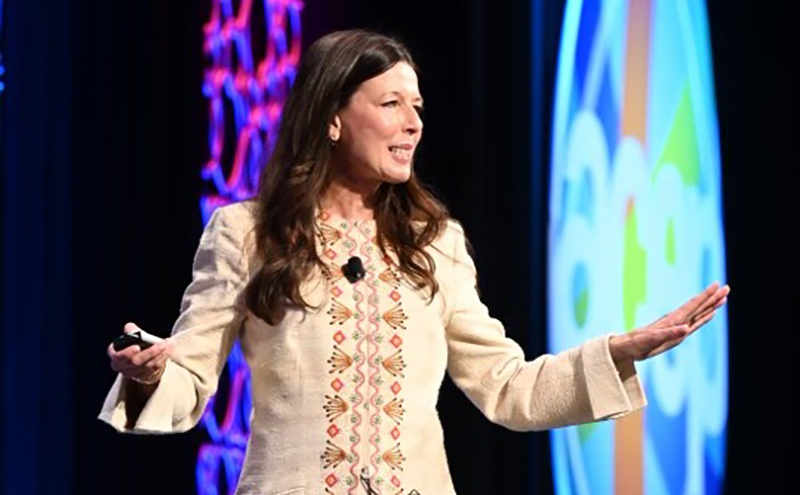During the ACEP23 Opening Session on Monday, Oct. 9, keynote speaker Helena Boschi, PhD, MSc, had us nodding, laughing, and scratching our heads as she used interactive exercises to show us the flaws of our brains’ design and how we can overcome them.
“The brain is designed to avoid death, not embrace life,” explained Dr. Boschi, a world-renowned applied neuroscience psychologist. She went on to explain how our scared brains deploy a negative bias that results in greater fixation, not always seeing the broader picture.
Dr. Boschi said negative information activates the brain more than positive information, and it sticks in our brain “like glue.” Not only is our brain hardwired to be scared, but it also wanders off a lot. And where does our mind wander? It usually goes straight to unhappy thoughts, causing us to worry and feel anxious.
“What does it mean when we come into the [emergency department] in a bad mood? Well, what happens is that we tend to become much narrower in our focus. This is called greater fixation,” she explained. “We don't see or entertain other possibilities. A positive, happy mood - when we've had a better start to the day - we operate a broader view, and we are able to take into account other pieces of information.”
Our mood affects the way we see the world, so we have to push back against our negatively-biased brains. Since the start of the pandemic, we find ourselves in a time during which emotions have heightened. With more fear comes more anger, since, as she explained, “fear is anger’s best friend.”
“Anger kicks in to help us strengthen our resolve, to give us the confidence to act, to help us do something about the fact that we've been frightened for so long,” she said. “But fear and anger tend to have a devastating effect on our thinking ability.”
Using a serious of thought-provoking visual demonstrations, session attendees experienced firsthand how our brains distort reality when fixated on only one thing.
Dr. Boschi said people “hate not knowing,” but emergency physicians are working in an environment loaded with uncertainty.
“The more uncertain you feel, the faster you will seek closure,” she said. “So many companies tell people to embrace change. And I say, don't bother - it never will. The brain will never embrace change because it's predictive. It needs to go on what it knows. So, we don't like change, but we need to get better at dealing with it.”
So how can we get the best out of our brain?
Get comfortable with uncertainty. How? Break routines, discuss uncertainty (to normalize it), and explore different possibilities. She also emphasized the importance of fitness because the brain and body are so connected.
Create environments where people feel like they have choice and control. “We hate being sold to, but we love buying things,” Dr. Boschi explained.
Her example of this concept had the whole crowd laughing. “If you are a cleaner in the bathrooms, and you are fed up because men aren't aiming straight into the basins, what do you do? Do you put a sign up saying, gentlemen, will you please aim straight?,” she asked. “Or do you paint a fly into the porcelain? And now men spend all their time trying to drown the fly. Problem solved!”
Carve out space. “A tiny pause helps the brain make a better decision,” she said. “You can’t think when you are too busy. Doing snap judgments may lead to the wrong conclusion.”
Embrace checks and balances. “We need to have people around us who see the world differently,” Dr. Boschi said.
Check your decisions with someone who is different, and have courage to be different. “We would rather be wrong together than right alone, so get people to question what they see.”
Dr. Boschi’s final piece of advice was to always stay curious. “See everyone and everything as an opportunity to learn. Keep an open mind,” she told the audience. “Remember, even though you've all seen similar things before [in the ED] and you might've seen lots of people coming in over and over again, everyone is different and unique.”





